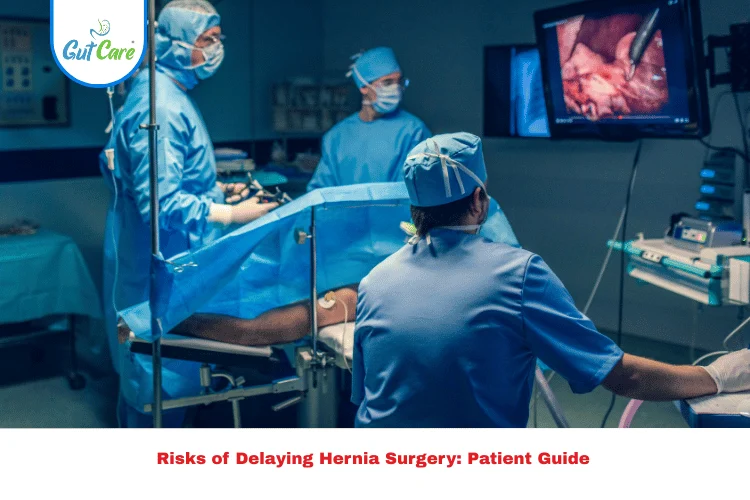When it comes to abdominal health, understanding Obstructed Hernia is essential. An Obstructed Hernia occurs when a part of the intestine becomes trapped in a weak spot of the abdominal wall, blocking normal bowel movement. This condition can cause discomfort, swelling, and pain if left untreated. At Gutcare Clinics, Bangalore, Dr. Yuvrajsingh Gehlot, an experienced colorectal surgeon, provides expert diagnosis and effective management for all types of hernia, including obstructed ones, ensuring patients receive the safest and most advanced care.
What is a Hernia?
To understand Obstructed Hernia, let’s start with the hernia definition.
A hernia occurs when an organ or tissue pushes through a weak spot in the surrounding muscle or connective tissue. It most commonly affects the abdomen or groin region. Depending on the location and severity, there are several types of hernia, including inguinal, femoral, umbilical, incisional, and hiatal hernias.
An Obstructed Hernia meaning specifically refers to a situation where the herniated part, often a section of the intestine, becomes trapped, preventing the normal flow of intestinal contents. This requires timely medical evaluation to prevent complications.
Common Risk Factors for Obstructed Hernia
Understanding hernia causes and risk factors helps in early prevention. The following are some of the most common hernia reasons that may lead to obstruction:
- Weak Abdominal Muscles
Some people are born with weak abdominal walls, making them more prone to hernias. This weakness can worsen with age. - Chronic Coughing or Straining
Persistent coughing or straining during bowel movements increases pressure in the abdomen, which can lead to a hernia. - Heavy Lifting
Lifting heavy objects without proper technique can put sudden stress on the abdominal muscles, leading to hernia formation. - Obesity
Excess body weight increases internal pressure on the abdomen, contributing to hernia development and risk of obstruction. - Previous Surgeries
Scars from earlier abdominal surgeries may weaken muscle tissue, making it easier for organs to push through. - Long-Term Constipation
Repeated straining during bowel movements is a major factor that can cause or worsen hernias over time.
Symptoms of an Obstructed Hernia
Recognizing the symptoms early can prevent serious complications. Common signs include:
- Sudden, persistent pain in the right abdomen or groin
- Swelling on the right side of the abdomen or around the hernia site
- Nausea or discomfort after meals
- Tenderness or visible bulge that doesn’t go away when lying down
- Feeling of heaviness or pressure in the abdomen
If any of these symptoms appear, it’s important to consult a medical expert immediately.
Diagnosis and Medical Evaluation
A proper diagnosis is the first step toward effective hernia treatment.
At Gutcare Clinics, Dr. Yuvrajsingh Gehlot performs a detailed physical examination and may recommend imaging tests such as an ultrasound or CT scan to assess the hernia type and severity.
Early detection helps prevent complications and ensures the most suitable treatment plan is chosen for each patient.
Prevention Tips for Obstructed Hernia
Preventing an Obstructed Hernia involves maintaining good abdominal health and avoiding activities that increase internal pressure. Below are some helpful tips:
- Maintain a Healthy Weight – Reducing excess weight decreases abdominal pressure and lowers hernia risk.
- Avoid Heavy Lifting – Use proper techniques or seek help when lifting objects.
- Eat a Fiber-Rich Diet – This helps prevent constipation and reduces straining.
- Exercise Regularly – Strengthening core muscles supports abdominal health.
- Quit Smoking – Smoking can lead to chronic cough, which increases pressure inside the abdomen.
- Treat Chronic Cough and Constipation Early – Managing these conditions can help prevent hernias.
Treatment Options for Obstructed Hernia
Treatment depends on the severity and type of hernia. Common hernia treatment methods include:
- Observation: Small hernias without symptoms may be monitored.
- Surgical Repair: Surgery is the standard treatment for most Obstructed Hernia cases to repair the weakened abdominal wall.
- Minimally Invasive Procedures: Modern laser-assisted and laparoscopic surgeries offer faster healing, less discomfort, and reduced recurrence risk.
At Gutcare Clinics, Dr. Yuvrajsingh Gehlot uses advanced techniques to ensure safe and effective recovery tailored to each patient’s condition.
Why Early Consultation Matters
Ignoring a hernia can lead to complications, especially when it becomes obstructed. Early diagnosis ensures better outcomes, prevents pain, and reduces the risk of intestinal blockage.
If you notice persistent swelling or abdominal discomfort, consult a qualified colorectal surgeon at Gutcare Clinics, Bangalore, for timely and professional guidance.
Conclusion
An Obstructed Hernia can be serious if not treated early, but with awareness and preventive care, risks can be minimized. By maintaining a healthy lifestyle and seeking expert medical advice when symptoms appear, you can ensure long-term abdominal health.
At Gutcare Clinics, Dr. Yuvrajsingh Gehlot provides trusted, advanced care for hernia management, helping patients achieve safe and lasting relief.
Frequently Asked Questions (FAQs)
1. What is an Obstructed Hernia?
An Obstructed Hernia occurs when a section of the intestine gets trapped within a hernia sac, blocking normal movement and causing pain or swelling.
2. What are common hernia causes?
Common hernia causes include muscle weakness, obesity, chronic coughing, and lifting heavy objects without proper support.
3. How is an Obstructed Hernia treated?
Hernia treatment often involves surgical repair to close the opening and restore normal bowel function. Early medical care is vital.
4. Can an Obstructed Hernia be prevented?
Yes, prevention is possible through weight control, avoiding heavy lifting, treating constipation early, and maintaining strong abdominal muscles.
5. Where can I get expert treatment for Obstructed Hernia in Bangalore?
At Gutcare Clinics, Dr. Yuvrajsingh Gehlot, a skilled colorectal surgeon, provides advanced and personalized hernia treatment for lasting relief.




